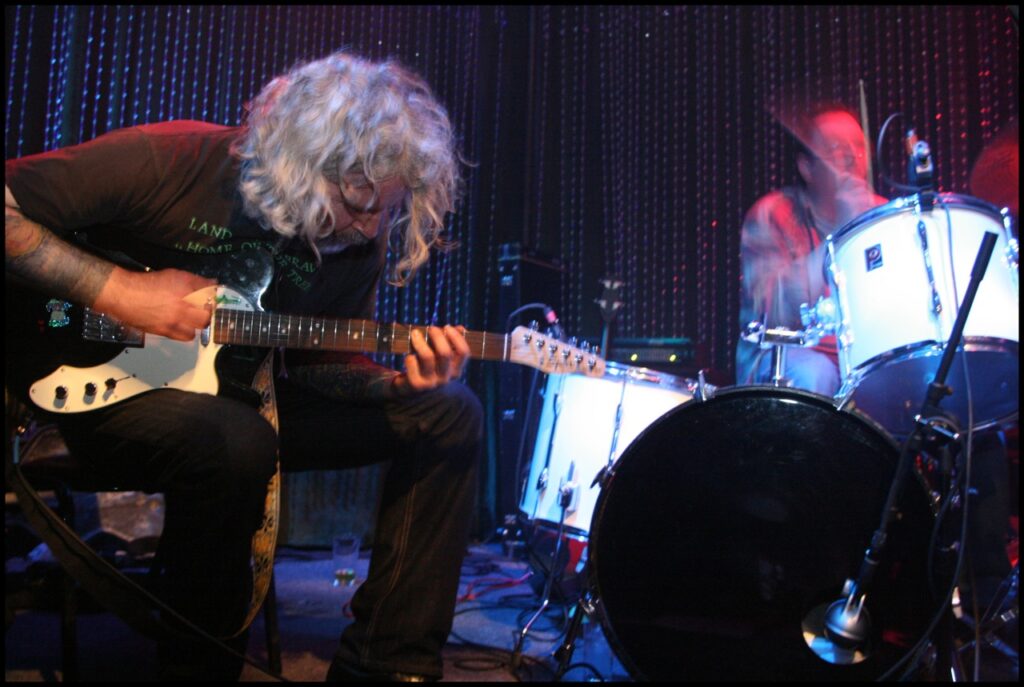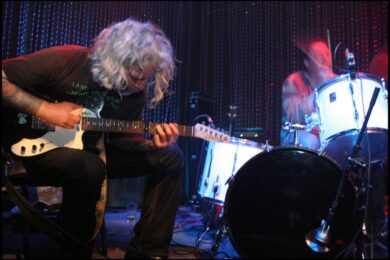Not one of the four members of Carlton Melton would say that music is their life. They have other things. Listening to them might suggest otherwise, given the gripping nature of their loose and primitive space-rock, but the Northern Californians are no careerists, nor are they egoists, nor narcissistic artistes.
For every band member, each in their 40’s, there are families, jobs and real-world responsibilities for the pulsing noise they make to contend with. And that’s a good thing, according to guitarist Rich Millman. "It keeps me grounded," he says. "If you talk to people who make a living from playing music they’re pretty busy, and it’s pretty short-lived."
We must, however, draw the line at ‘hobbyists’. A passing amateur passion to stave off mid-life crises this is not. After all, for Millman and guitarist/drummer Andy Duvall, this is their second time around having previously enjoyed a heady spell on Sub Pop in the 90s when they made up Zen Guerrilla, a garagey bunch whose sound their current thick psychedelic soup is far removed from. But their priorities are somewhat different now.
"I have a young family to take care of," says Millman. "I have a seven-year-old son and a four-year-old daughter. When you start a family and look back [on Zen Guerrilla], it’s hard to imagine. It’s like a previous life."
Carlton Melton have made two albums since they started out in 2008, and for several reasons these recordings are unique. For one, they were recorded in what is known as a geodesic dome in rural Mendocino County, north of San Francisco. These domes are typically large spherical buildings shaped like golf balls used as homes for the green-minded, greenhouses, theatres or whatever. Carlton Melton’s dome is miles away from anywhere and is hollow. The place makes Bron Yr Aur look state-of-the-art, so unequipped to record music is it. Yet the band love it, and its ruggedness is there in the music.
Their first LP, Live In Point Arena, was passed on to friends as CDRs. One copy made it into the hands of Aquarius Records in San Francisco, who demanded more to sell, and thus word got around the Bay Area that members of Zen Guerrilla had resurrected themselves, and Carlton Melton began to get noticed.
Their second album is Pass It On…, which features as opener a raging cover version of Pink Floyd’s uncelebrated track ‘When You’re In’ from their 1972 soundtrack album Obscured By Clouds. The rest of the record is not so raucous, proving that in their meandering, improvised jam sessions in the dome, there is a communal wish to affect the listener with woozier instrumentals as well as join fellow Californians and good friends Wooden Shjips in amplifying minimalist, repetitive drone-rock to unseen levels.
Millman in particular is an interesting fellow. Having been in a band in Zen Guerrilla who tasted moderate success and attention on a major label, he now literally just plays music with friends from high school when time allows. The Carlton Melton four have only been up to the dome, in which one member actually lives, four times in two years, and only three of them are able to play live regularly (two members of the band have never been in a band before and had never previously performed in front of strangers). Millman still finds time to oversee the band’s own label Mid-To-Late, and over the phone from California, is a very friendly man.
People who work with Millman in his day job capacity as a landscaper probably just regard him as "the dude who plays music in his spare time" without realising the scope of Carlton Melton’s powers. By day, he tends to the garden, but by night – or one-weekend-every-six-months-at-the-dome – he is a psych-rock Hercules…
So can you tell me about how you came to record in this dome?
Rich Millman: Brian [McDougall, drums] lives in a geodesic dome. I live in San Francisco but he’s about a three-hour drive north along the coast, he’s lived up there for the last 25 years. When we were 18 or 19 he bought property up there and discovered the dome pre-existing on it. I guess a hippy built it back in the 60s who then vacated it. Brian cleared it out and started living there but that one started to rot, so he decided to pull it down, then bought a kit to build a new one. It’s about 24ft x 24ft feet and 17ft high. It’s amazing when you walk in there.
We talked about it and said to him, "Before you bring in any furniture let’s set up some amps, party and record music." So we recorded mono, direct to four-track tape, recording straight for a couple of days and then picked out the best parts. Everything’s improvised, nothing’s rehearsed, and it’s all just first take. We’re out in the woods, off the grid, running everything off generators.
Any problems with recording that way?
RM: A lot of studios are soundproof and a lot of sound gets compressed inside, but I wanted the opposite, with sound coming out and swirling around and that’s what the dome gives you. For this kind of music it’s perfect.
What made you decide to cover ‘When You’re In’? I’ve always thought Obscured By Clouds is Pink Floyd’s most underrated album, and it was after that when it all started to go down hill for them.
RM: Oh ok. Well, I’ve had that record on cassette since I was a teenager. There’s that soundtrack and the More soundtrack and they’re both great. When we were in Zen Guerrilla, Andy and I would do a lot of touring, driving around in the van through the night and we used to listen to those two records and that one riff really stood out for me – it’s just a real simple riff over and over. Then we were up there in the dome and I started playing the riff, Andy recognised it and we recorded it in one take. When we listened back to it, it was probably the heaviest thing we had recorded at that point.
It wasn’t "let’s try and do something psychedelic by Pink Floyd"; it’s just such a great riff. It’s really short and sweet when they do it but we stretched it out. Andy was saying it’s a very Native-American sounding riff.
How do you and Andy you look back on your time in Zen Guerrilla?
RM: It’s been quite a while now – that was like 10 years ago, before I had a family. We all grew up playing together but we reached a point where it wasn’t fun anymore and we wanted to wind things down and play something like Carlton Melton. We’re very proud of it, it was good music, but we’re really stoked about what we’re doing right now. We’ve evolved a lot music-wise.
How does San Francisco’s music scene compare with when you were playing in the 90s?
RM: There’s a lot of great bands now and Carlton Melton was very well received. Ripley from Wooden Shjips is very supportive, we played a show with Earthless where Isaiah the guitarist came up and played that Pink Floyd song with us… Assemble Head in Sunburst Sound… Everyone’s really friendly and it’s a breath of fresh air. In the 90s bands would be a little standoffish and everyone was trying a little too hard to be hardcore or whatever.
A lot of interesting bands from round there at the moment, as ever.
RM: Yeah. We played with White Hills, and Dave is just the nicest person you could ever meet. We played with Sleepy Sun who are all in their 20s – very cool and very nice. I can’t say enough about those younger bands. Very positive, very supportive and you get a sense talking to them there’s something beyond the music. If you take away their band they’re still gonna be doing cool stuff. They’re good people.
So San Francisco hasn’t sold out as much as people say it has?
RM: Well San Francisco draws a lot of people and it’s a transient town – people come and go and there’s a lot of new energy. It’s really small, nothing like London or New York, and it’s beautiful. If you get in a car and drive for half an hour you’re in the mountains. You know, those bands in the 60s like the Grateful Dead moved out of the city into the country. Practically all those bands started out in San Francisco and gravitated towards the country. And we get that feeling when we go up and see Brian, we get it about 20 miles out of San Francisco. Leaving people and everything behind and just going to play music is a great feeling.
What qualities are required in a musician to play improvised music like you do?
RM: With us, nobody knows what’s going to happen. We don’t really talk about it, no one says, "you do this and I’ll do that," it’s more hit it and quit it. You don’t want it to be contrived. I guess you’ve got to be open to what someone else is going to play and you can’t force it. You just go in there, you don’t even make eye contact, and no one stops and says, "hey try that again". We don’t even listen to it until a couple of weeks later.
That’s a big change from the Zen Guerrilla days.
RM: Yeah absolutely, although Andy and I would sit in a rehearsal back then and play tonnes of Carlton Melton-type stuff but it would never see the light of day. When you’re on a label like Sub Pop there’s expectations, and they want songs.
Finally, how do you think Carlton Melton’s music is best experienced?
RM: I’d be happy if a band is on tour, like Sleepy Sun or somebody, and they’re driving across the country and it’s two in the morning, and there’s a guy up front driving with his co-pilot, and they throw on Carlton Melton. That would make me happy and they’d probably get through another hour of driving through Kansas. Our music’s for other bands to listen to in the middle of the night as they drive from one town to the other.



